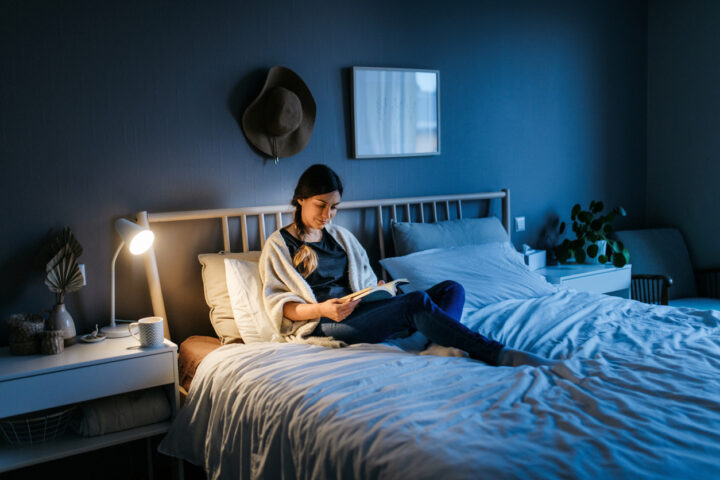According to the National Institutes of Health, up to 70 million Americans have chronic or ongoing sleep disorders. At least 40% of surveyed adults also reported falling asleep during the day without intending to at least once per month.
Sleep deficiency can have severe consequences, such as an increased risk of health problems like obesity, depression, diabetes, and heart disease. While you might not consistently achieve a peaceful night’s slumber, there’s potential for you to improve your chances by taking some of the following actions!
1. Try CBD Gummies
While CBD gummies for sleep might not be something you’ve considered in the past, current evidence suggests CBD might provide the desired results. Many CBD products, like gummies, contain CBD, CBN, THC, and melatonin, which might help you fall asleep and stay asleep easier.
A 2018 study found that CBD provided symptom relief in insomniacs, while a review stated that CBD oil reduced PTSD-related sleep disturbances. The same study also indicated that CBD might help those living with REM sleep behavior disorder and Parkinson’s disease. We don’t yet know which dosages are the most effective or safe for use, but 300 to 600 milligrams might cause sleepiness.
If you’ve never used CBD products before, either for sleep or anything else, talk to your local CBD product stockist to learn more. They can recommend products that might best suit your needs and discuss dosages to ensure you’re maximizing any potential benefits.

2. Improve Your Bedtime Schedule
Many people go to bed when they feel tired rather than when they should be going to bed to get an adequate number of hours of quality sleep for the next day’s activities. Improve your bedtime schedule, and you might be surprised by how fresh and well-rested you feel when you awake to start your day.
Set an alarm on your phone to go to bed at the same time each evening and to wake up at the same time each day. Ensure this same consistency on the weekends, even when it can be tempting to sleep in.
However, if you’re finding that you’re lying awake, tossing and turning, rather than drifting off to sleep, consider extending your schedule. Some people find it much easier to fall asleep when they go to bed when they’re tired.
3. Be Active
We all know that exercise is vital for our overall health and well-being, but not everyone is aware that it can also be essential for achieving quality sleep. While further research is required to explore the connection further, researchers believe exercise is an effective intervention for people not currently experiencing enough high-quality sleep.
Avoid vigorous workouts an hour before bed, but consider incorporating exercise elsewhere in your day, such as a bike ride in the morning or yoga in the afternoon.

4. Make Your Bedroom a Haven for Rest
It’s all too easy to make your bedroom an extension of the rest of your home. You might have a TV, a gaming system, a computer, and a number of electronics that you use in your spare time. If you’re struggling to achieve restful sleep, consider removing these devices from your bedroom.
Turning your bedroom into a restful haven without distractions and technology might lay a foundation for quality sleep. Invest in blackout curtains to reduce how much light filters through and ensure it’s of a comfortable temperature for sleep.
According to the Sleep Foundation, the best sleeping temperature is 65 degrees Fahrenheit, with doctors recommending setting your thermostat between 60 to 67 degrees. When you’re warm, comfortable, and lack distractions, it might not be long until you’re drifting off to sleep and waking up in the morning feeling well-rested.
5. Don’t Eat Large Meals Before Bed
While everyone feels hungry at different times of the day and night, consider adjusting your eating routine if you regularly eat your evening meal within a few hours of retiring for the night. The smaller the window between dinner and bedtime, the more uncomfortable you might be when you’re trying to sleep.
Our bodies need time to digest food; otherwise, you might experience acid reflux, indigestion, or general discomfort. If you’re feeling hungry after your main meal, consider light snacks like bananas, popcorn, or herbal tea.

6. Avoid Caffeine
Many of us feel like we need caffeine to remain energized throughout the day, and most coffee drinkers start their day with at least one coffee. While caffeinated beverages likely won’t affect your sleep when you consume them in the morning and into the early afternoon, there’s a chance they might if consumed in the later afternoon and evening.
Studies show that a moderate caffeine dose at bedtime, three hours before bedtime, and six hours before bedtime significantly affects sleep disturbance. By consuming caffeine-free beverages during the afternoon, you might enjoy more restful and high-quality sleep.
7. Create a Bedtime Routine
Some people have no problems navigating the chaos and bedlam of their days before falling into bed and drifting off almost immediately. However, others have a hard time switching off and letting go of the day’s events. If you fit into the latter category, a bedtime routine might be necessary for ensuring better sleep quality.
A bedtime routine can consist of activities that help you unwind, relax, and prepare for sleep. Each evening, you might do several things to help you feel rested and calm, like meditating, stretching, taking a warm shower, and reading a book. Start your routine at least an hour before bedtime and remain consistent for the best chance of success.

8. Take Care With Naps
Naps can be beneficial for reducing fatigue and helping you feel relaxed, but that doesn’t mean your current napping routine is doing your nighttime schedule any favors. Naps can result in nighttime sleep problems and sleep inertia, both of which can be challenging to combat. Avoid napping in the late afternoon and for long periods. Instead, keep your naps short at 10 to 20 minutes to avoid feelings of grogginess upon waking.
Achieving high-quality sleep is not always easy, especially when you’re currently trapped in an unhealthy routine. However, a few minor changes might lay a foundation for improved sleep, allowing you to wake up refreshed and ready to start your day.




